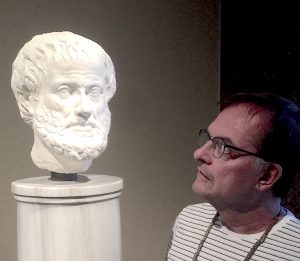When people hear the word “philosophy” they often think of philosophical doctrines or concepts. While these big ideas and the arguments that support them are important, Western philosophy includes a long tradition of dialogue, or genuine conversation, in which people collaborate in the pursuit of wisdom, which is not merely a matter of knowing things or publishing articles and books. Rather, the collaborative pursuit of wisdom improves the quality of one’s life.
What can philosophy do for you?
Living philosophy maximizes your autonomy. None of us selected the circumstances of our lives or the gifts Nature has given us. Rather, we are thrown into a world we didn’t choose, and we are confronted by forces and things we cannot control. Nevertheless, we shape our lives by our choices, and with the tools of philosophy, you can improve your ability to differentiate between what is given and must be accepted and what can be shaped by your choices. Philosophy gives you the knowledge and skills to make those choices wisely.

Using philosophical tools to live well is what links philosophical practice today with the history and traditions of philosophy — especially of Socrates, for whom life without the practice of philosophy was not worth living. Socrates claimed that the pursuit of truth through philosophical discussion is essential to the ethical life, which to him meant a life of rational self-governance. He recognized that we cannot choose everything about our lives, but it is the exercise of choice guided by principles that lays the foundation for living well.
The practice of philosophy leads to a deepened understanding of the assumptions that lie behind our conscious attitudes and judgments. The Greek word for truth, aletheia, literally means “un-forgotten,” and philosophical practice helps us unforget and disclose unacknowledged assumptions that lock us in patterns of thought and behavior — patterns that can stand in the way of living well.
A deeper understanding of the self and the world in which you finds yourself can lead to better communication, both with yourself and with others. Many people suffer from negative “self-talk” that derives from unwarranted or untested assumptions. The critical tools of philosophy can help you evaluate your “internal conversation” and make your self-assessment and self-talk more realistic. Similarly, these tools can be of great value in fostering genuine, productive communication with others, in any setting.
Finally, philosophy contributes to a richer emotional life. Acting wisely means acting on the basis of the available knowledge evaluated as fairly as possible. We are taught to believe that this means being “dispassionate,” disconnected from emotion. To some extent this advice can be helpful: It is painful to be buffeted by emotional states that seem to overpower us. But without emotion, our experience would be a colorless, directionless flux. To be oriented in our world, we need our emotions as much as we need knowledge. Living philosophy teaches that emotions are also sources of orientation in the world, but emotions and knowledge must be managed productively if we are to live well. Philosophy offers us the tools we need to manage information from the heart as well as the head and the senses.
Who benefits from philosophical practice?
Anyone interested in maximizing autonomy may find philosophical practice a source of help and encouragement. People looking for a deeper self-understanding or a more robust sense of the meaning of their lives may turn to philosophical practice for the tools to pursue these goals. Organizations of all sizes have challenges in communication and knowledge management, and the tools of philosophical practice can improve these areas. Groups of any size, from intimate relationships to corporations, have challenges of fostering emotional connection and health, and the tools and techniques of living philosophy contribute to healthey organizational dynamics, identity, and transformation.
I want to learn more about philosophical practice. What do I do next?
There are resources to help you get started. Academic philosophy tends to be focused more on techniques and doctrines than on the practice of philosophy, but you can learn quite a lot about philosophy (and yourself) from tackling classic texts. Most of us find it helpful to have a guide—someone who has explored the territory and lived to tell about it! I offer informal classes and workshops on specific topics or skills, in addition to individual and group consultation. Email me at matthew@liveyourvirtue.com for more information.